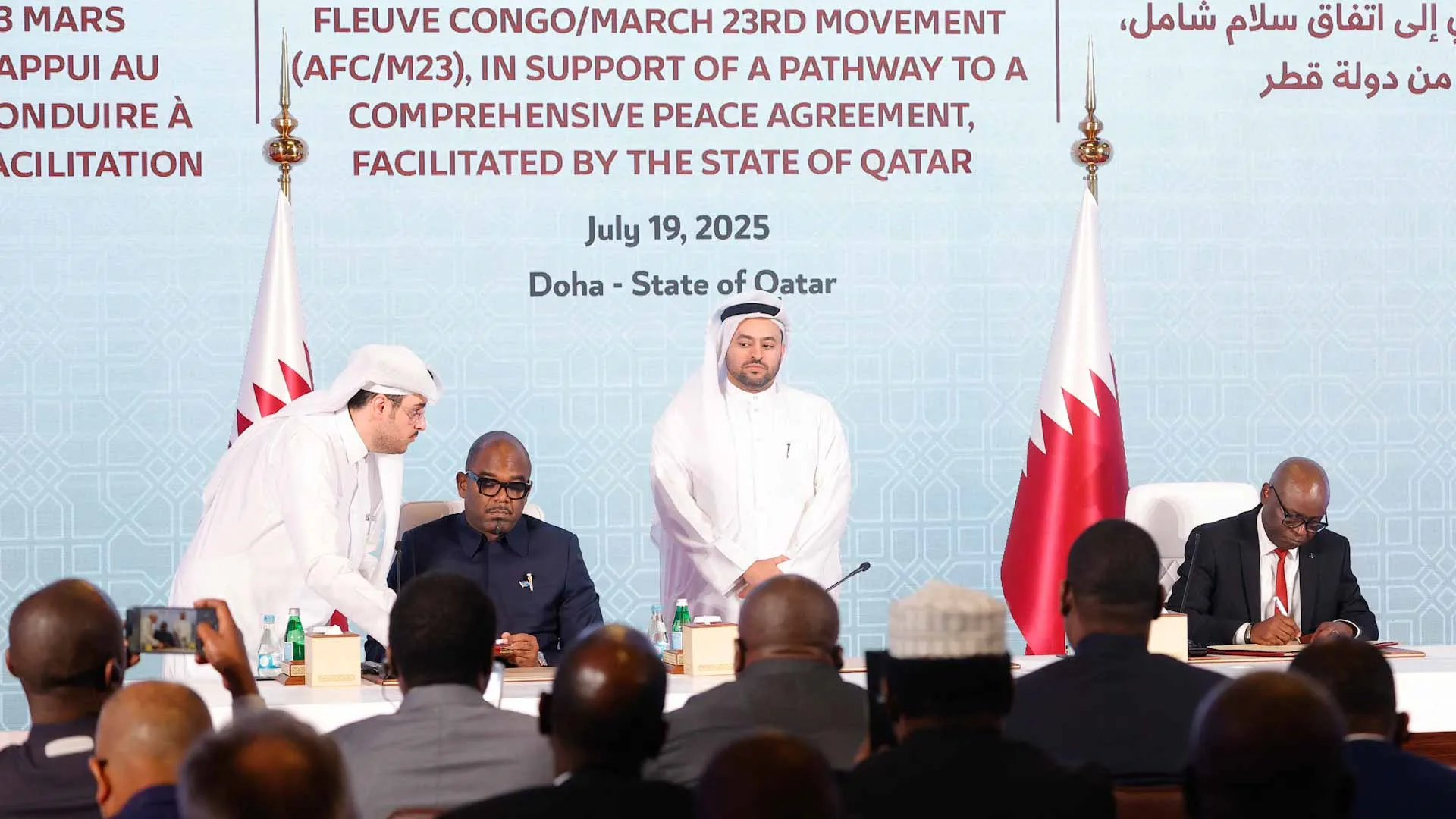DOHA, Qatar — A significant step towards peace in the Democratic Republic of Congo (DRC) was taken on Saturday as the Congolese government and the Rwanda-backed M23 armed group signed a ceasefire deal. The agreement, forged after three months of intensive talks in Qatar, aims to bring an end to the devastating conflict that has plagued the country’s mineral-rich eastern region.
The two sides formalized a “declaration of principles” that includes a commitment to a “permanent ceasefire.”
This accord follows a separate peace deal signed last month in Washington between the Congolese and Rwandan governments, brokered with U.S. facilitation.
For over three decades, eastern DRC, abundant in lucrative minerals, has been ravaged by conflict, leading to a severe humanitarian crisis and displacing hundreds of thousands of people.
Earlier this year, a swift offensive by the M23 rebels in January and February saw the group seize vast territories, including the key provincial capitals of Goma and Bukavu, resulting in thousands of fatalities.
In the agreement signed in Doha, both warring parties pledged to “uphold their commitment to a permanent ceasefire.” This includes refraining from “hate propaganda” and “any attempt to seize by force new positions.”
The deal also outlines a roadmap for restoring state authority across eastern DRC and commits both sides to opening direct negotiations towards a comprehensive peace agreement.
Congolese presidential envoy Sumbu Sita Mambu and M23 permanent secretary Benjamin Mbonimpa formally sealed the agreement with a handshake during a ceremony held in the Qatari capital.
The M23 had previously insisted on pursuing its own ceasefire deal directly with Kinshasa, arguing that the DRC-Rwanda agreement signed in Washington in June did not address various “problems” that required resolution.
However, both sides have now stated that this new Doha agreement aligns with the Washington accord, which U.S. President Donald Trump had previously hailed as the commencement of “a new chapter of hope and opportunity” for the region.
The African Union (AU) has welcomed the new agreement as a “significant development,” issuing a statement that reads: “This… marks a major milestone in the ongoing efforts to achieve lasting peace, security, and stability in eastern DRC and the wider Great Lakes region.”
“Red lines” and future steps
Congolese government spokesman Patrick Muyaya confirmed that the Doha deal incorporates the DRC’s “red lines,” which notably include “the non-negotiable withdrawal of the M23 from occupied areas followed by the deployment of our institutions,” including the armed forces. He indicated that a comprehensive peace agreement would follow “in the coming days.”
The parties have agreed to implement the terms of this declaration by July 29 at the latest, with negotiations for a comprehensive agreement slated to begin by August 8.
Meanwhile, Rwandan President Paul Kagame and Congolese President Felix Tshisekedi are anticipated to meet in the coming months to further solidify the Washington peace deal, the terms of which have yet to be fully implemented.
Questions persist regarding an expected side deal on economic issues, particularly after President Donald Trump alluded to securing access to the vast mineral wealth in the Central African nation.
Also Read: DR Congo suspends ex-President Kabila’s party, seizes assets over alleged M23 links
President Tshisekedi had confirmed in April that he discussed a deal for access to the DRC’s mineral wealth with U.S. special envoy Massad Boulos.
Boulos, who was present at the signing ceremony in Doha, emphasized that the restoration of the Congolese government’s control over its eastern territory is “one of the most important clauses” in the new agreement.
However, he cautioned at a press conference that “we know that there are no magic solutions” to ending the conflict, “especially regarding the timeline.”
The path to lasting peace remains challenging, as previous ceasefire agreements for eastern DRC have unfortunately collapsed in the past. While Rwanda consistently denies providing military backing to the M23, United Nations experts have presented reports suggesting the Rwandan army played a “critical” role in the group’s offensive, including direct combat operations.
Although the front line has largely stabilized since February, intermittent fighting continues to break out between the M23 and various pro-government militias.

